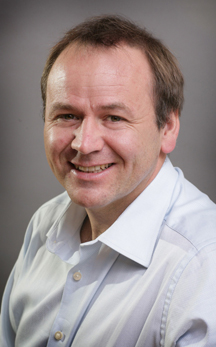New $1.5 Million Grant Funds Work to Develop New Cancer Drugs
By Eric Sauter
Scientists from the Florida campus of The Scripps Research Institute (TSRI) have been awarded a $1.5 million grant from the National Institutes of Health (NIH) to develop drug candidates that could treat cancer and neurodegenerative disease.
Derek Duckett, a TSRI associate professor of molecular therapeutics, is the co-principal investigator for the three-year study, along with John Cleveland of the Moffitt Cancer Center in Tampa, Florida. Duckett, Cleveland and their teams will look for compounds that affect a key enzyme involved in the degradation and ultimate recycling of damaged cellular material.
This process, called “autophagy,” is an ancient, cannibalistic (literally “self-eating”) pathway that acts as the main recycling center of all cells. In autophagy, bulk cytoplasmic material and aged or damaged organelles are recycled via the lysosome to recoup essential building blocks and adenosine triphosphate (ATP) as a survival strategy during times of stress or nutrient limitation. Autophagy is an important cell survival pathway, and any defects in its regulation can lead to a variety of disorders, including neurodegenerative disorders, liver disease and cancer.
The study is focused on targeting a particular enzyme, UNC-51-like kinase-1 (Ulk1), a critical on-off switch that regulates this pathway.
“Using these funds, we will identify new inhibitors of Ulk1,” Duckett said. “Developing selective molecular probes that function as Ulk1-specific inhibitors would improve our understanding of the autophagy pathway, its relationship to cancer and its utility as a target that could augment conventional or targeted anti-cancer treatments.”
Duckett and his colleagues plan to use the high-throughput screening facilities at Scripps Florida and the Scripps Drug Discovery Library and its 650,000-plus library of small-molecule compounds.
The number of the new grant from the NIH National Institute of General Medical Sciences is 1R01GM113972.
Send comments to: press[at]scripps.edu














